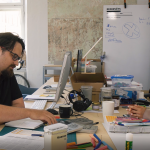“Circular economy is inevitable,” emphasized Jana Simanovska, project expert at Ecodesign Competence Centre and a researcher at Vidzeme University of Applied Sciences during the annual Vidzeme Innovation conference in Latvia organized by Vidzeme Planning Region. Watch the video about the opportunities, future trends, challenges implementing the principles of the circular economy.
The circular economy means that society does not live with the idea of producing waste. Every product, when we do not need it anymore, can be used as raw material for new products.
As said by Simanovska, we live in a linear economy. “It means that we acquire raw materials, we produce something and use it. We sell it, and somebody uses it. What happens to the product in the end and where it goes? Mostly it ends up in the trash. According to the statistics, about 95% of all raw materials, which we acquired, end up in the trash,” says Simanovska.
Humanity is on the verge of serious changes. Simanovska points out that even the previously criticized predictions about overexploitation of resources and global pollution are becoming a reality. It means that we need to think seriously about how we use resources.
She shows several examples, arguing that it is an excessive waste generation that is the cause of negative climate change and various environmental problems. “We are talking more about how waste affects marine life. In about 20 years, there will be more plastic in the sea than marine life.”
In the year 2008 when a Waste Framework Directive was published, it introduced a waste management hierarchy. “It defines what we should do primarily. We should start with waste prevention. Then – reduce it. Only if we can’t prevent or reduce it, we should recycle the waste. Only if we can’t recycle, and return it to circulation, we should produce energy from it or compost. The last thing we should do is bury it. In Latvia, the first thing we do – we bury it. That is what we do the most,” explains Simanovska.
In 2015, the United Nations (UN) Sustainable Development Goals were adopted. Responsible production and consumption are one of the goals the countries agreed on. According to Simanovska, it demands that we reduce consumption of energy and resources, pollution in production, and to produce sustainable products. “UN goals are a global agreement. They are also in the EU circular economy package. It carries many changes in legislation in Latvia as well,” says Simanovska.
She invites everyone to think what are the things and functions that are really necessary for everyday life. “It’s a circular economy idea that we can get the same service and maintain the quality of life we’re used to, but with less resource consumption.”
Watch the full video (19 min):





